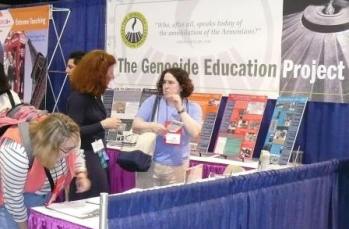 Los Angeles, CA– An innovative program called The Genocide Education Project (GEP) was founded in 2005 in order to instruct educators on the attempted extermination of the Armenian people in the Ottoman Empire in 1915. The mission of the GEP is to “help prevent genocide by assisting educators, students, and educational organizations with teaching and learning about genocide and other major human rights violations, with specific focus on the Armenian Genocide”, as stated on the organization’s website.
Los Angeles, CA– An innovative program called The Genocide Education Project (GEP) was founded in 2005 in order to instruct educators on the attempted extermination of the Armenian people in the Ottoman Empire in 1915. The mission of the GEP is to “help prevent genocide by assisting educators, students, and educational organizations with teaching and learning about genocide and other major human rights violations, with specific focus on the Armenian Genocide”, as stated on the organization’s website.
This extraordinary non-profit organization seeks to establish a national presence in order to bring adequate genocide education to students and teachers all over the country. In order to achieve this goal, the organization is working to expand the implementation of GEP instructional material in school districts across the nation. Raffi Momjian, co-founder and current Executive Director, explains “…proper genocide education is lacking at the high school level. What the Genocide Education Project does is create an opportunity for high school level educators to teach about genocide effectively.”
One of the challenges faced by the creators of GEP was to create material that would enable educators who are unfamiliar with the details of the genocide of the Armenians to teach the material to their students. Momjian states, “We develop resources that can be used at a high school level as well as a web based resource libraries for teachers. “We not only educate teachers about the Genocide but also provide the teaching tools they need and show them how they can be used.” These resources include eyewitness accounts, New York Times articles, web-based activities for a more hands-on experience and pre-made lesson plans ready for the teachers to utilize.
The Los Angeles Unified School District (LAUSD) has partnered up with the GEP in order to provide proper instruction and materials to nearly 300 history teachers. This has been a very vital and important step for the GEP as the LAUSD is the second largest school district in the nation. Workshops are being conducted several times a year to familiarize teachers with the material and its importance.
The GEP has partnered with other organizations such as the Choices Program, United States Holocaust Memorial Museum, and Facing History and Ourselves at the National Council for Social Studies Annual Conference (NCSS) in the past in order to hold all-day clinics on the Armenian Genocide. Momjian emphasizes the important impact these clinics at the NCSS make as the teachers go back to their own school district and are able to communicate their newfound knowledge to other educators.
In order to reach a greater number of educators, the GEP is also creating an intensive weeklong retreat for teachers. During this retreat, the teachers will be trained on the details of the Armenian Genocide, as well as how to present this material to students, with hopes that these teachers will in turn educate other teachers at their individual schools. In addition to the retreat, other plans that are in the works for the GEP also include virtual training. Teachers will soon be able to access training tools online and take virtual classes to aid them in teaching the subject matter.
Momjian says that the responsibility to educate future generations about the Armenian Genocide belongs to us all. He says, “…just reaching one teacher is great and important but community support is just as essential, especially to Armenians, for a program such as this one to thrive.” The GEP is truly one of a kind as it provides every resource and guidance that an educator may need to teach this material at a high school level and does so effectively.
The Armenian National Committee – Western Region is the largest and most influential Armenian American grassroots advocacy organization in the Western United States. Working in coordination with a network of offices, chapters, and supporters throughout the Western United States and affiliated organizations around the country, the ANC-WR advances the concerns of the Armenian American community on a broad range of issues.
###
Photo Caption – Educators at the Genocide Education Project’s NCSS 2007 booth.